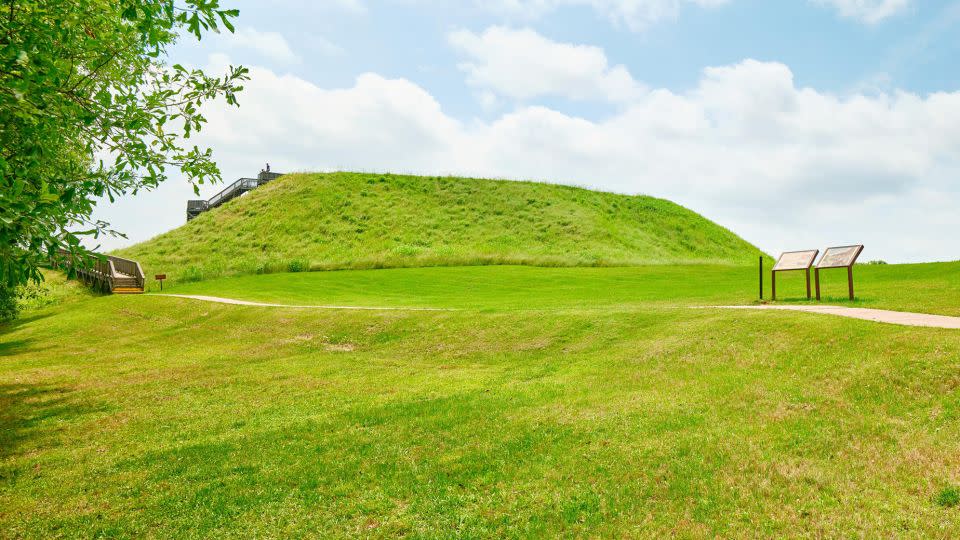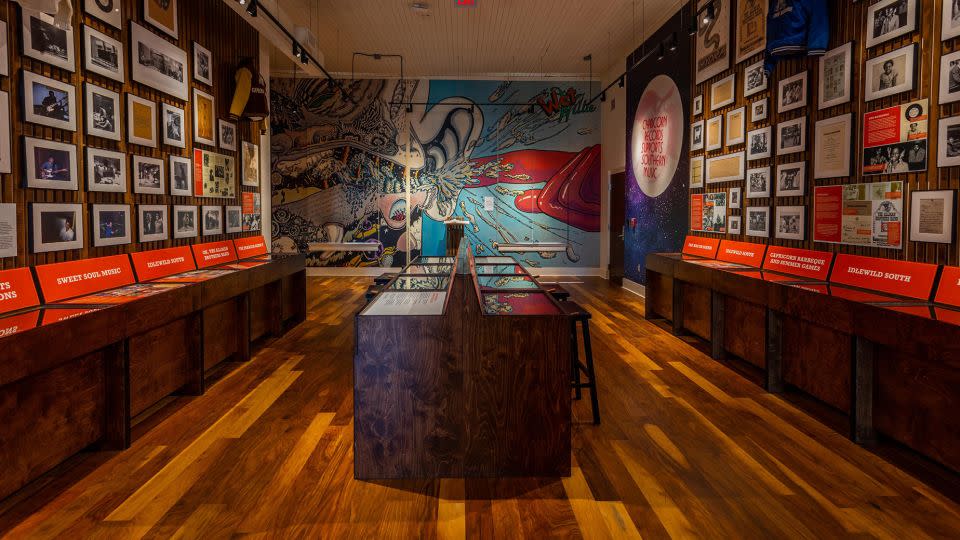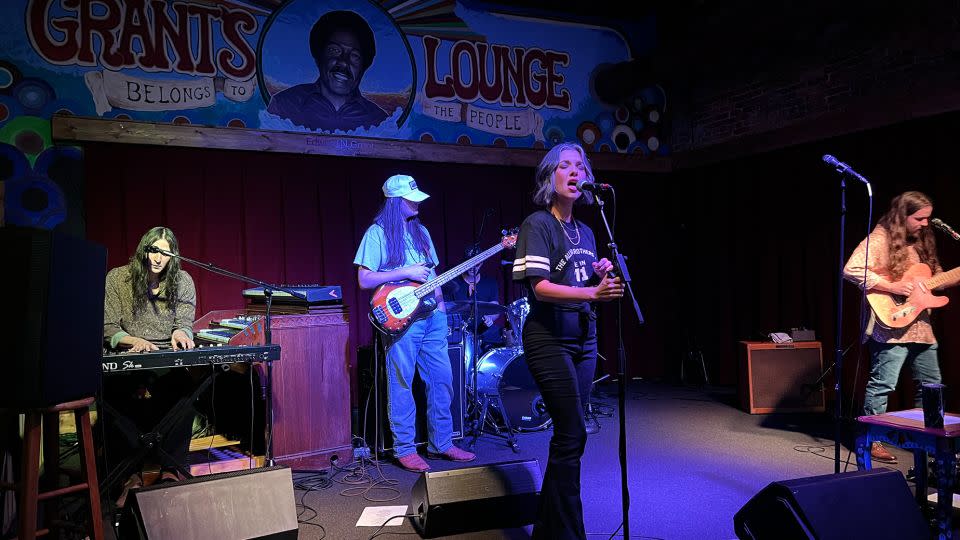How the Southern city of Macon went from ‘ghost town’ to ‘popping’ destination
unknown content item
-
Stroll through downtown Macon, and you’ll find craft brewpubs not far from a lounge that’s been keeping music lovers entertained for half a century. A beloved new bagel shop is a half-mile walk from a soul food classic that’s still serving fried chicken and collard greens 65 years after opening.
The past and the present are both alive and well along streets lined with architectural beauties dating as far back as the 1820s.
But not too long ago, this hilly city on the Fall Line between Georgia’s Piedmont and Coastal Plain had fallen on hard times.
“When I first got here, Macon was a ghost town,” said Richard Brent, who arrived in central Georgia in 2007 as a construction project manager and eventually went from a volunteer to executive director at The Big House Museum, which is packed with memorabilia from its time as headquarters for the Allman Brothers Band. “I traded in a hardhat for some AC and rock ‘n’ roll music,” Brent said.
A wise trade in a city that’s been leaning hard into its musical heritage, opening attraction after attraction in recent years highlighting Macon’s ties to artists including Little Richard, Otis Redding and the Allman Brothers. Macon has used its musical history — “the backbone of the city,” Brent said — as a force for revitalization and tourism growth.
And that’s not the only history Macon is weaving into its present-day story.
The city may be on the verge of having Georgia’s first national park at Ocmulgee Mounds across the river. The new designation would further protect the ancestral homeland of the Muscogee (Creek) Nation, whose members were forcibly removed to Oklahoma nearly two centuries ago.
And in April, markers were unveiled downtown telling the long scarcely mentioned history of Macon’s mid-1800s slave markets as well as the story of the Cotton Avenue District, a historic hub for African American-owned businesses known as Macon’s “Black Wall Street.”
“Macon is really at a time where they’re saying we need to really reconcile our history, and we need to honor all parts of it, good and bad,” said Tracie Revis, director of advocacy for the Ocmulgee National Park & Preserve Initiative that has spearheaded the national park effort.
All this activity makes for a prime time to explore this Southern city.
A national park in the making
Just across the Ocmulgee River from downtown Macon, the Ocmulgee Mounds National Historical Park represents more than 12,000 years of continuous human habitation. The last of several prehistoric cultures to inhabit the area, the Mississippians arrived around 900 CE and built the mounds that are preserved in the park today.

A short walk from the visitor center, a reconstructed earth lodge features the original Mississippian floor with the indentation of 50 seats, a fire pit and a bird effigy indicative of its use as a ceremonial council chamber. Farther into the park, a wooden staircase leads to the top of the Great Temple Mound for views the town chief would have had over the community in the 10th century CE. It’s estimated that 10 million baskets of dirt were required to construct the 55-foot-tall mound.
Descendants of the mounds’ builders, the Muscogee (Creek) were forcibly removed to Oklahoma hundreds of years later during the Creek Trail of Tears in the 1830s.
Legislation recently introduced in both houses of Congress would expand the park, knitting together more land and changing its National Park Service designation from a historical park to Ocmulgee Mounds National Park & Preserve. If passed, it would also establish the Muscogee Nation as co-managers of the park, making it the only national park to be co-managed by a removed tribe.
Revis, who moved to Macon two-and-a half years ago to work on the park effort, noted that after the Muscogee (Creek) were removed to Oklahoma, the site became a slave plantation.
“So it’s knowing that this one story led into another story which led into the founding of this area. And it’s reconciling all of those histories,” said Revis, who is Muscogee and Yuchi.
And that includes “the indigenous story that we kind of erased and bring that back to life and allow the people who went through that to tell their own story.”
Music’s in the air
Music is another strong thread in Macon’s history, and the city has been busy bringing it to life for visitors.
The Otis Redding Foundation was created in 2007. The “Big House” opened in 2009. A Little Richard childhood home opened as a community center in 2019. A shuttered recording studio and new museum — a cradle of Southern rock with an Otis Redding origin story — opened to the public in 2020. A new amphitheater with capacity for 12,000 opened in March.
Rock ‘n’ roll pioneer Little Richard (aka Richard Wayne Penniman) was born in Macon. And “King of Soul” Otis Redding moved to town at a young age and eventually started blending his gospel roots with the “more raucous style” of Little Richard, says one display in the small museum dedicated to Redding’s life.
That museum is set to get bigger (probably in early 2025) once space is freed up with the completion later this year of a new Otis Redding Center for the Arts right up the street, according to Karla Redding-Andrews, who is Otis Redding’s daughter. The center (right across the street from a historic-office-building-turned boutique hotel) will expand on the Otis Redding Foundation’s mission of empowering young people through music education.

“Everything is just really popping and growing in downtown Macon,” said Redding-Andrews, who is vice president and executive director of the Otis Redding Foundation. And had her father not died in a 1967 plane crash, she believes he would still be at the heart of it.
“He would remain right here, his offices were located at 535 Cotton Avenue, which is about four blocks from here, and he would be an integral part of walking these streets every day, inspiring young people in our programs and in the school system,” Redding-Andrews said.
Early on, Redding performed at the now-restored 1921 Douglass Theater, which also showcased the talents of Bessie Smith, James Brown, Ma Rainey and Little Richard, and caught the notice of Phil Walden, who became his manager and a partner in their shared venture, Redwal Music Inc.
It was Redding’s untimely death, leaving Walden without a top artist, that led to the birth of Capricorn Records and Walden’s work with the Allman Brothers Band.
In 1969, Walden signed guitarist Duane Allman, who assembled the band and moved to Macon to work with Capricorn. Today, visitors can tour the reopened Capricorn Sound Studios, which are once again recording new music, and visit a museum that features memorabilia and a deep well of music in its interactive “digital record bin.”
The “Big House” on Vineville Avenue north of downtown also welcomes music fans from all over the world. From 1970 to 1973, some members of the band lived in the handsome 1904 Tudor house. (It’s just one of Macon’s many grand historic homes, which include lavish antebellum mansions.)
Duane Allman and Berry Oakley both died in motorcycle accidents in Macon in 1971 and 1972, respectively, but the other original members — Jaimoe, Dickey Betts, Butch Trucks and Gregg Allman — kept the band going in various forms until 2014. The house is full of memorabilia and personal belongings, and the setting served as inspiration for some of the band’s biggest songs.
“Like Dickey wrote ‘Ramblin’ Man’ in the kitchen, so ‘rollin’ down Highway 41,’ well, there’s Highway 41 right there,” said Brent, gesturing toward the street outside. “He wrote ‘Blue Sky’ in the room right here beside us, and ‘good ol’ Sunday morning bells are ringing everywhere,’ that’s right across the street, you know,’ ” he said, pointing out a church.
An entire house dedicated to a single band is “like a true step back in time,” Brent said. “If you leave the real world out there, you can come in here and you just feel like it’s 1970 all over again.”
Honoring the past, looking to the future
On a Thursday night downtown, it was more like 1971 for Macon resident Corliss McKenzie, who pointed out a decades-old snapshot of herself on a wall of Grant’s Lounge that’s packed with photos of music legends. Grant’s was the first truly integrated nightclub in Macon when it was opened that year by Edward Grant Sr., a Black hospitality veteran who had previously managed James Brown’s Golden Platter restaurants.

“It used to be the spot to hang in at, and if you wanted to listen to rock music, you was gonna hear it [at Grant’s],” McKenzie said as Joan Jett’s “I Love Rock ‘n’ Roll” blasted in the background.
The lounge served as a testing ground and performance venue for Capricorn artists, and it’s still a place where musicians recording at the revived studios come to perform.
McKenzie, who has long-lasting ties with Grant’s and recently ended up there on her 73rd birthday, recalled the days when the Allman Brothers and Wet Willie played the lounge. And she reminisced about some of the businesses that endured downtown — Grant’s and local burger favorite The Rookery — after the opening of a big suburban mall in the mid-’70s drained downtown of much of its commercial activity.
Another beloved institution is H&H, a soul food restaurant founded in 1959. One of the founders, “Mama Louise” Hudson, developed a nurturing relationship with the nascent Allman Brothers Band that lasted for decades. “Hands down” the place to go for soul food – fried chicken, mac ‘n’ cheese and collards, a young local woman said.
Today, the city’s list of newer, notable eateries is growing: Piedmont Brewery and Kitchen and Ocmulgee Brewpub for casual fare; Oliver’s Corner Bistro or Dovetail for something more upscale; Macon Bagels for a tasty sandwich.
unknown content item
-
And less than a 10-minute drive northwest of downtown, in a circa-1960s commercial strip, the well-established local favorite Ingleside Village Pizza has been joined by popular newcomer Oh Honey Baking Co. And in fitting Macon fashion, the string of businesses includes a live music venue: The Society Garden. The indoor/outdoor cocktail bar and beer garden with a central stage and an Italian food truck was just starting to buzz with happy-hour revelers on a balmy weeknight this spring.
Some women from Macon and surrounding towns who had gathered in the back garden were a bit dubious about the city’s growing draw as a travel destination. But they acknowledged that distinctive locally owned businesses — and events such as the city’s Cherry Blossom Festival, massive Christmas lights display and Macon Bacon summer baseball games — help attract people.
And by the venue’s entrance, a vibrant mural of Little Richard reminds guests of exactly the sort of energy that put this city on the map.
Next town: Grand Rapids, Michigan is No. 8
Find out why “Beer City USA” is so much more than a drinking town.
For more CNN news and newsletters create an account at CNN.com


